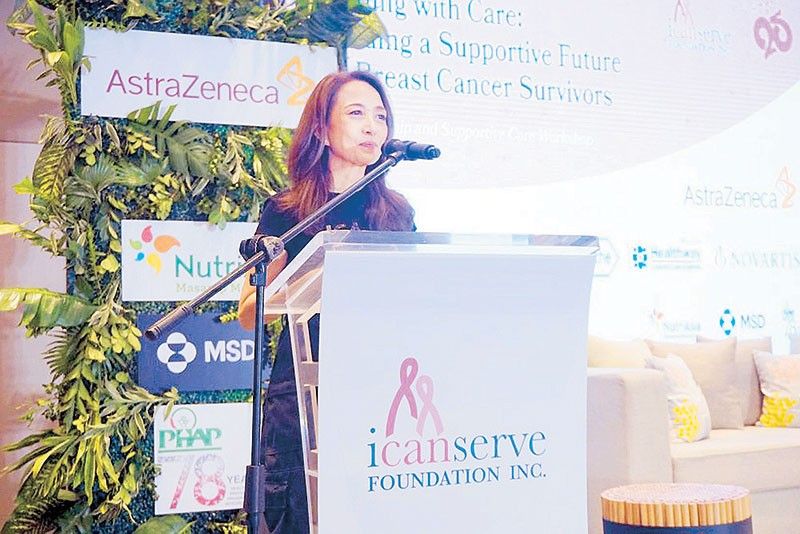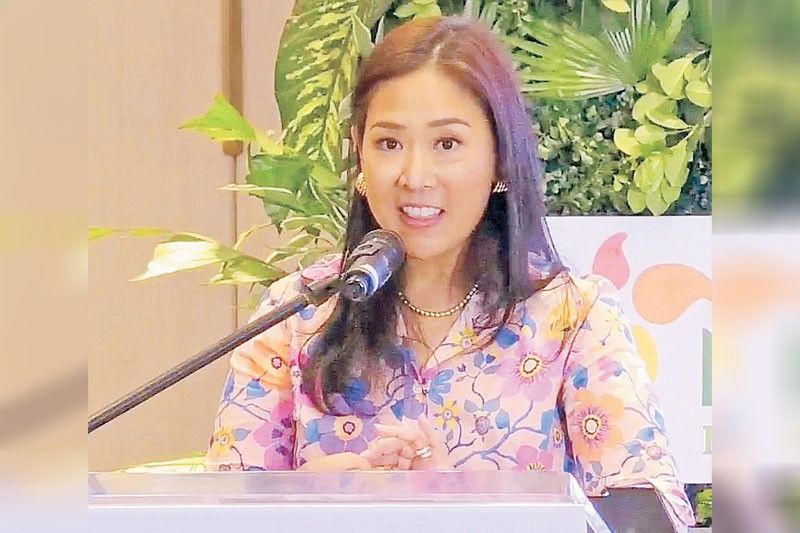For breast cancer patients, survivorship is ‘a new normal’


She was changing out of her gym wear when she felt a lump on her breast. Though she leads a healthy and active lifestyle, Keri Zamora somehow felt it was breast cancer.
“At the time of my (hormone- positive HER-negative breast cancer) diagnosis in 2019, it was also my mom’s caregiver,” Keri shared. “Mama was diagnosed with the same type of breast cancer — just 12 weeks before me.”
When one gets diagnosed with cancer, not only does it affect the patient but the whole family and their loved ones as well.
“I was heartbroken. My youngest was only six years old,” said Keri, a doting mom of four and loving wife to San Juan Mayor Francis Zamora. “And my husband, who I have not seen cry in years, broke down in the halls of Makati Medical Center. At that time, we thought cancer meant immediate death.”
It took a while for Keri to realize that worrying wouldn’t change anything. And so, she put her warrior hat on.
“I underwent chemo right away. It was tough, but the love and support of my friends and family helped me get through it,” she related.
A month after, Keri had her daily radiation for 33 days.
“I’ve never prayed so hard in my life,” Keri said.
Keri’s mom passed away last year after battling metastatic breast cancer for four years. Although it shook Keri and left her vulnerable, she continued to hope and have faith that everything would be okay. Just as her mom would always tell her.
“I will be celebrating my sixth year as a cancer survivor in February 2025,” she disclosed.
As her way of giving back, Keri put up two foundations — the Caring Keri Foundation and Metro Manila Mayor Spouses Foundation — that help women and children with their needs by providing medical assistance, livelihood programs, mental health seminars, and free-screening for breast cancer.
Keri was one of the guest speakers at the recent breast cancer survivorship and supportive care workshop titled “Leading with Care: Building a Supportive Future for Breast Cancer Survivors,” held at Seda Hotel in Bonifacio Global City (BGC), Taguig.
Organized by ICanServe Foundation Inc. (ICS), the two-day event gathered healthcare professionals, patient advocates, and government representatives with the goal of addressing the often-overlooked need for comprehensive long-term care for breast cancer survivors in the Philippines.
While much attention is placed on the physical challenges of battling breast cancer, this year’s workshop puts equal emphasis on the mental health and emotional well-being of survivors, recognizing the critical role that these factors play in the overall survivorship journey.

Shifting the paradigm of breast cancer care
Being a cancer survivor is one of the most gratifying labels a patient may have the pleasure of experiencing. However, “breast cancer survivorship doesn’t end with treatment.”
This was emphasized by Kara Magsanoc-Alikpala, founding president of ICS, who opened the workshop with a powerful message about survivorship care.
For breast cancer patients, survivorship is “a new normal.”
“Survivorship is an ongoing journey requiring resilience and collective effort from society at large,” Kara emphasized.
Sharing her personal experience as a cancer survivor, Kara recounted how a misdiagnosis almost cost her valuable time in receiving treatment.
"I got sick 27 years ago, and they said it wasn’t cancer because I was still too young. Thankfully, my father insisted on a biopsy. When I sought a second opinion abroad, I discovered a crucial difference — patients there are treated as partners in their healing journey. They expect you to make informed decisions about your health. This was a revelation to me because, back home in the Philippines, patients often lack empowerment in making such choices," she explained.
Kara stressed the need to bring this patient-partnership mindset to the Philippines. Through the ICS’s flagship program “Ating Dibdibin,” the foundation partners with local governments to institutionalize breast cancer care programs that span early detection, treatment, and survivorship care. This program currently works with six city partners, with outcomes indicating reduced death rates and minimal out-of-pocket expenses for patients.
Addressing mental health in survivorship
Beyond the physical recovery from breast cancer, many survivors face significant emotional and mental health challenges. These challenges were at the forefront during the panel discussion with psychologist Lia Delgado-Infante and writer-editor Alya Honasan, herself a breast cancer survivor.
Lia underscored the importance of addressing the fears that often accompany a cancer diagnosis. "It’s normal to feel scared when diagnosed with cancer, but you don’t have to face it alone. Prioritizing mental health is just as crucial as medical treatment," she said.
Alya echoed this sentiment.
"There’s a persistent stigma around discussing sensitive health issues — whether it’s mental health or other topics like sexual health, survivors often feel embarrassed or ashamed," Honasan said. She urged survivors to seek emotional support, noting that mental health struggles should not be viewed as weaknesses.
Both Lia and Alya advocated for holistic care that integrates mental health services into cancer survivorship programs.
Financial navigation
The financial burden that often accompanies a cancer diagnosis was also tackled during the workshop. The session on "Financial Navigation Throughout the Cancer Journey," moderated by Chiqui Roa-Puno, provided valuable insights into how institutions like PhilHealth can help ease the financial strain of cancer treatment.
Representatives from the Philippine Cancer Society and Department of Health (DOH) shared information on accessing various financial assistance programs available to cancer patients.
Participants drafted policy recommendations aimed at establishing one-stop-shop survivorship care clinics across the country and making supportive services more accessible nationwide.
The ICS workshop demonstrated that a brighter, more supportive future for breast cancer survivors is possible through collaboration. The event received support from key partners, including AstraZeneca, Bio-ONCO, Roche, Novartis, MSD, Healthway Cancer Care Hospital, NutriAsia, and Pharmaceutical and Healthcare Association of the Philippines (PHAP).
"The future we envision for cancer care requires a collective shift in mindset and resources. We must rally together to create a healthcare system where no one is left behind,” Kara added.



















